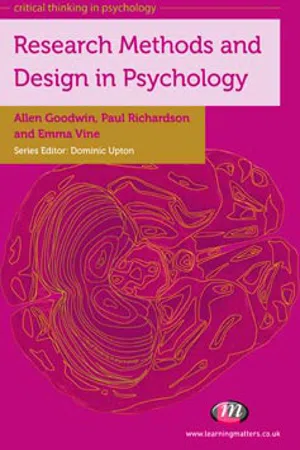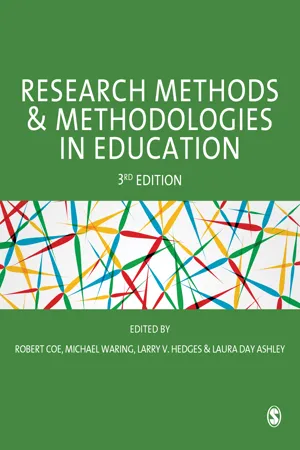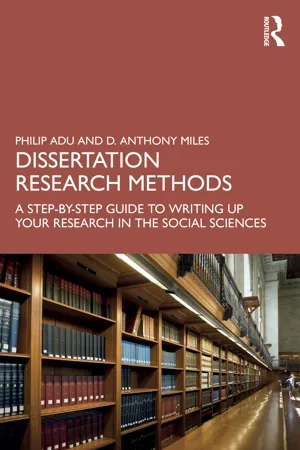Psychology
Planning and Conducting Research
Planning and conducting research in psychology involves the systematic process of defining research questions, selecting appropriate methods, and collecting and analyzing data to answer those questions. This process requires careful consideration of ethical guidelines, potential biases, and the reliability and validity of the research instruments used. Effective research planning is essential for producing meaningful and credible findings in psychology.
Written by Perlego with AI-assistance
Related key terms
5 Key excerpts on "Planning and Conducting Research"
- eBook - ePub
- Paul Richardson, Allen Goodwin, Emma Vine(Authors)
- 2011(Publication Date)
- Learning Matters(Publisher)
Chapter 1Designing psychological research studies
Learning outcomes
This chapter will outline the phases and problems associated with the early stage of conducting research. It will take you through the process of finding, defining and designing a research question and highlight the factors that need to be considered.By the end of this chapter you should:– understand the stages involved in setting up a research study;– be able to undertake the process of finding, defining and designing a research study;– understand the importance of a literature review in the process of conducting research;– understand the need for a formal operationalisation of the research question;– be aware of the problems of capturing a measure;– be aware of the issues of validity, reliability and confounds.Introduction
The statement that ‘Good researchers are made, not born’ is worth keeping in mind when you approach the design of research studies. Far too often it is assumed that the ability to conduct research is somehow innate or easy. The truth is far more brutal – good research is a process based on acquired knowledge and experience. In order to make this whole process less daunting, we can start by fragmenting the research process into discrete steps. The reasons are twofold. The first is that to approach the process as a whole entity may be beyond our cognitive ability (there are only a limited number of cognitive balls that we can juggle). Secondly, through the categorisation of each stage, we can minimise errors that we may make along the way. It is important to realise that the use of the most sophisticated statistical analysis does not compensate for a badly framed research question - eBook - ePub
- Robert Coe, Michael Waring, Larry V Hedges, Laura Day Ashley, Robert Coe, Michael Waring, Larry V Hedges, Laura Day Ashley(Authors)
- 2021(Publication Date)
- SAGE Publications Ltd(Publisher)
5 Planning Your Research Laura Day AshleyWhy is planning important?
Embarking on a research project can be overwhelming, particularly if it is the first time you have ever done such a thing. Planning is an important skill which can help you progress your research from the initial inception of an idea through to the collection and analysis of data and writing up your project. Rather than simply approaching the project in a linear fashion undertaking one task at a time in sequence, planning can encourage you to think ahead to future stages of your research and conceptualise your project as a whole. It can also enable you to anticipate potential problems you may face during the research process and consider potential resolutions to those problems in advance – as the old saying claims, ‘forewarned is forearmed’. Through the process of planning you can start to take ownership of your research and realise that effectively you are the ‘manager’ of your project. As Jennifer Mason has argued, ‘researchers should always be driven by a quest to appreciate and investigate the world in all its complexities, and to resist any imperative to conform in an unthinking or merely habitual way to methodological orthodoxies or conventions’ (2017: 51) and through this active, yet challenging, process ‘researchers become real methodological thinkers rather than rule-followers’ (2017: 51). By planning you can start to prepare and equip yourself for the difficult decisions you may have to make along your research journey.Starting to plan early on
Planning is especially relevant in the early stages to help you think about the range of tasks you will need to complete before you actually start collecting your data. This section details a number of ‘prestudy tasks’ (Glesne, 2016) that you may need to consider, and suggests some strategies and techniques to aid your planning activities. There is some logic to the sequence in which these tasks are presented; however, they may not be carried out in this precise order. As each element of research connects with the next, you may find that you need to consider tasks further down the list before you can adequately plan for earlier ones. - eBook - ePub
Dissertation Research Methods
A Step-by-Step Guide to Writing Up Your Research in the Social Sciences
- Philip Adu, D. Anthony Miles(Authors)
- 2023(Publication Date)
- Routledge(Publisher)
The progress of a research project is attributed to its successful planning. The planning of a project is further attributed to how the researcher executes the project and their ability to manage the many aspects of it. The planning of the research project also involves collecting the kind of data needed and the cooperation of the organizations involved. The research project’s success is critically dependent on the cooperation of organizations and institutions. The planning of the research has to also consider the management of participants, sampling, data preparation and data analysis.In this chapter, we provide an introduction to many elements associated with the planning of a research project, including information on defining the research problem and the research objective. The chapter then discusses the many aspects of planning the research project. It also provides much-needed information on the practice of planning a research project for novice researchers and doctoral students.Developing the Plan for Research
When planning a research project, the project should be divided into subparts. This is key to ensuring that every aspect of the project and its elements are addressed. Again, the progress of a research project is attributed to its successful planning. The planning of a research project also involves data collection management and the cooperation of the organizations involved. The planning of a research project has to consider the management of participants, sampling, data preparation and data analysis. The research plan is a document that sets forth a clear objective and precisely what the researcher must do to address the research problem. Finn (2005) - eBook - ePub
- Perry R. Hinton, Isabella McMurray(Authors)
- 2017(Publication Date)
- Routledge(Publisher)
2 Undertaking a research projectTHE RESEARCH PROCESS STAGE 1: THE PURPOSE OF THE RESEARCH STAGE 2: SETTING UP THE STUDY STAGE 3: CARRYING OUT THE RESEARCH AND COLLECTING THE DATA STAGE 4: MAKING SENSE OF THE DATA STAGE 5: PRESENTING THE RESEARCH FINDINGSChapter aim: To explain the process of doing researchIn all areas of academic study, we undertake some form of research. We do this because we want to find things out – we want to gain new information and further insight into the topic under investigation. However, we need to consider exactly what we want to achieve by the research. What are the questions that we wish to be answered by undertaking the research? When we are clear on what we want to find out we can select an appropriate research method and decide how we will collect the data. In some disciplines, research may be characterised by conducting complex experiments using technological equipment in laboratories, yet in other subject areas it might involve the analysis of the words used in a Shakespeare play or the observations recorded from a business meeting. Whatever method we use, research is all about undertaking a careful investigation that systematically produces new information relevant to the topic under study and, if done properly, meets the aims and objectives of the research and provides answers to the questions being asked. Different subject areas will develop different research methods in order to collect the most appropriate data. The research data is analysed and presented in different formats such as words, graphs and tables to describe what was found out in a report – providing an account of what was done, why and what was achieved. This is important as it means that other people can check the work, making sure that the researchers have not made mistakes, ignored crucial factors or misinterpreted the information. It also means that, if the work is done well, other researchers can read the report and share the findings that have been produced – which can then influence their own research work. Collectively, individual pieces of research can combine to create a complex understanding of the subject area under study. - eBook - ePub
Researching Education
Perspectives and Techniques
- Kanka Mallick, Gajendra Verma(Authors)
- 2005(Publication Date)
- Routledge(Publisher)
- Too great a concentration when reading the literature on the findings at the expense of the methodology employed and the instruments used. Since these papers have been written by successful researchers, they should be treated as opportunities to learn something of the research process as well as the results.
- Failure to define carefully the topic limits. If it is too broadly defined, there is simply too much to read as carefully as is needed. If it is too narrowly defined, important papers may be omitted and the project may be impoverished.
- Too much (or too little) material in the form of extracts from research papers and so on, copied on to note cards.
Preparation of the Research Plan
Once the researcher has worked through the stages discussed above and has arrived at a hypothesis to be tested or research questions to be answered, it becomes necessary to devise a plan of action which will map out the processes involved in order to achieve his or her objectives. As was seen in Chapter 5 , many approaches are open to an educational researcher, and in Chapter 6 we dealt with some of the tools available. Taken together, they provide almost endless possibilities for differing research plans, so this section will necessarily concern itself with general principles that it would be well to observe.Most research projects fall into four phases which correspond to the nature of the work to be done at various times during the study. The research plan reflects this. However, like most plans, it suggests that one group of activities always precede and are completed before the next group begins. In real life, this does not always happen: activities tend to overlap and merge.Phase I
An early part of the study will be the literature search, since this forms a vital part of the identification and formulation of the research problem. The hypothesis or research questions will largely determine what has to be done. Let us suppose that the study requires the use of a questionnaire, a standard psychological test and some interviews, and that these are to be employed on a sample of adolescents in schools. As soon as possible after this point, provision should be made to make initial contact with schools to find out if, in principle, they would be willing to cooperate by allowing access.
Index pages curate the most relevant extracts from our library of academic textbooks. They’ve been created using an in-house natural language model (NLM), each adding context and meaning to key research topics.




